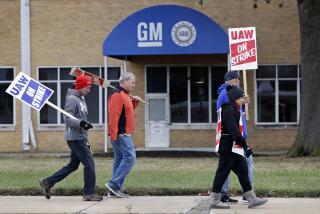GM-Chrysler merger rumor picks up speed
- Share via
The idea that General Motors Corp. could buy Chrysler Group has many heads shaking in bemusement, but some who watch the U.S. auto industry say the concept might actually gain traction.
One of the big reasons cited for accepting such a prospect as credible is that by acquiring Chrysler Group, which builds more than 2.5 million vehicles a year, GM would put a stop to talk that it is about to be overtaken as the world’s largest automaker by Japanese juggernaut Toyota Motor Corp.
“It’s not a good business reason, but pride is a powerful thing,” said Tom Libby of J.D. Power & Associates.
The Troy, Mich.-based analyst was among several industry experts who expressed skepticism about such a union after trade publication Automotive News reported Friday that GM and Chrysler parent DaimlerChrysler were in talks.
Toyota, which drew to within a few hundred thousand vehicles of topping GM’s global production in 2006, is widely expected to take the lead as early as this year as it expands around the world and GM scales back in North America.
Combining GM and the maker of Chrysler, Dodge and Jeep vehicles certainly would be complicated, said Lincoln Merrihew, a Boston-based analyst at market research firm TNS.
“But there’s that corporate psyche, and it would be very painful for the people at GM to see their company fall from being No. 1,” said Merrihew, adding that potential savings in design, engineering and purchasing made a tie-up worth exploring.
GM shares fell 10 cents to $36.34 as investors tried to come to grips with the potential effects of acquiring Chrysler. DaimlerChrysler shares gained $3.08, or 4.4%, to $73.33, their highest price in more than seven years.
As the market delivered that message, many analysts saw folly in the idea, offering a long list of potential barriers.
“The blind leading the blind” is how Shelly Lombard of Gimme Credit characterized the idea.
The Philadelphia-based corporate credit analyst, in a note to clients, wrote that GM remained immersed in a difficult recovery effort after losing $10.6 billon in 2005. Chrysler, which reported a net loss of $1.5 billion last year, is beset by many of the same challenges amid slumping sales and rising employee and retiree benefit and healthcare costs.
“Maybe there are potential synergies and cost savings,” Lombard wrote. “But so much of GM’s problem is related to legacy costs, and we don’t see how a merger would fix a problem that needs to be addressed during union negotiations.”
One impediment to a deal, analysts noted, is that although GM and Ford Motor Co. won concessions on retiree healthcare costs from the United Auto Workers last year, the union would not offer Chrysler the same terms because the automaker was profitable at the time. As a result, many wonder why GM would want to try to absorb a competitor with bigger labor woes than its own.
GM and DaimlerChrysler probably have been talking, said John Novak, automotive analyst at Morningstar Inc. in Chicago. But a GM purchase of Chrysler would entail “massive amounts” of plant closures and job cuts.
“Even making changes in the dealer networks would be very difficult. It’s very hard to shut down a dealership. They have rights protected under franchise laws,” he said.
One industry watcher who believes GM executives are interested in pursuing Chrysler believes that the potential benefits will blind them to the liabilities.
“A deal will happen if terms can be agreed,” said Ken Elias, Scottsdale, Ariz.-based partner at independent consulting firm Maryann Keller & Associates.
He speculated that GM’s big sport utility vehicles would replace Chrysler’s, variations of Chrysler’s big cars such as the 300 sedan would use a rear-wheel-drive platform that GM is developing and GM would gain a “clean” diesel technology developed by Daimler in Germany and used in the U.S. by Chrysler.
“I can see the logic to a deal, but I think it will turn out to be a huge distraction and drain on GM,” Elias said, adding that a decision would be unlikely before the U.S. automakers hashed out a three-year labor agreement with the UAW in September.
J.D. Power analyst Libby said that if DaimlerChrysler wanted to unload Chrysler Group badly enough, a fire-sale price “could be so low GM just can’t say no.”
DaimlerChrysler was created when Daimler-Benz paid $36 billion in 1998 to buy Chrysler Corp.
On Wednesday analyst Ron Tadross of Banc of America Securities valued Chrysler Group at $5 billion. Novak of Morningstar said Friday that he believed $10 billion to $20 billion would be more realistic.
The possibility of a GM-Chrysler union surfaced in a German business magazine Wednesday, when DaimlerChrysler said it would not rule out a sale of its ailing U.S. unit. Chrysler reported a loss for 2006 that day and outlined plans to slash U.S. and Canadian payrolls by 13,000 jobs, or 16%.
But just as Los Angeles lives on word of celebrity divorces and entertainment industry deals, and Washington on political rumor, Detroit wallows in news, confirmed or not, of the doings of its automakers.
On Friday, the idea began spreading like a wind-whipped wildfire in Malibu Canyon when Automotive News, Motown’s answer to Daily Variety, filed its report about GM-Chrysler talks -- based on what it said was confirmation from high-level insiders it could not name. Spokesmen for the companies remained mum other than to point out, as Tom Wilkinson of GM noted, that automakers routinely talk to competitors about potential business combinations.
The official silence served only to stoke speculation, as well as flights of fancy.
Analyst Merrihew of TNS foresaw some potentially strange outcomes: “Can you envision a Chevrolet-Dodge-Buick-Jeep dealership?”
*
martin.zimmerman@latimes.com






